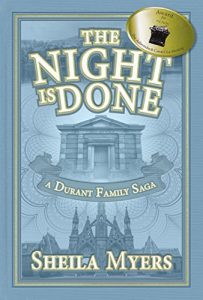When the Hero’s Journey Doesn’t Pan Out The Way You Thought it Should
 The main character in my historical novels—William—was a real person. He cheated on his wife, swindled his sister out of her inheritance, and left his family bankrupt. Yet somehow, after filling 900 pages of a saga about him and his family, I managed to make him likeable. So I can’t figure out why it is, that in my WIP novel (again based on actual events), I’ve written it from the perspective of a fictional character that none of my beta readers seems to like, including me. Yes, I hate my main character.
The main character in my historical novels—William—was a real person. He cheated on his wife, swindled his sister out of her inheritance, and left his family bankrupt. Yet somehow, after filling 900 pages of a saga about him and his family, I managed to make him likeable. So I can’t figure out why it is, that in my WIP novel (again based on actual events), I’ve written it from the perspective of a fictional character that none of my beta readers seems to like, including me. Yes, I hate my main character.
I tried to make Tripp (my character) follow the hero’s journey, you know, the one you’ve seen in almost every Hollywood film made: the main character has a flaw and he/she is asked to embark on a perilous journey—could be psychological or a physical one—the journey transforms his/her mind, heart, soul—the end. The reader stays glued to pages because they have a vested interest in this journey.
While constructing Tripp, I had to follow a script of actual events, which are rather depressing, but I figured he’d be the guy that everyone would want to follow because everyone knows someone like him. I picked the name because it’s a nickname for the third, as in John William III. That right there tells you something about him: privileged, white male, as were most of the villains in the historic events I’m writing about.
The plot however involves multi-cultural perspectives. This is a story about the smuggling trade, both contraband and humans. In short it is about how big corporations entered the black market in cigarettes across the Canadian/U.S. border and exploited the unique geography of the Native American Mohawk Nation to do so. I wrote about how timid I felt writing the novel in an earlier blog post.
A subplot is the smuggling of Chinese nationals, including a famous incident where over 300 people were abandoned on a shipwreck right off the coast of New York City after paying thousands of dollars to be smuggled in and spending months at sea. In response, a few unsavory lawyers offered legal services to these vulnerable souls that were, for the most part, illegal. Many lawyers and executives were arrested and sent to jail.
When I sent my draft to a few beta readers, one—whom I connected with through the WWWB Facebook page—told me Tripp didn’t deserve a happy ending. In her words: The writing is solid, but Tripp has so much white, male privilege, that he doesn’t acknowledge. He just doesn’t seem like he’s earned his redemption.
Damn! I thought I had it covered in the story.
According to The Writer’s Journey: Mythic Structure for Writers, by Christopher Vogler, a book I read to give me some inspiration, Tripp’s journey would include an ‘Ordeal’ and the beginning of the hero’s awareness that to complete their journey they must change.
I thought I took Tripp through the journey but I think the real problem is, I didn’t. And I didn’t because I don’t like him. To be honest, while writing his perspective I conjured up the image of Bradley Cooper in the movie He’s Just Not That Into You. If anyone has seen it, they may recall the scene where Cooper is about to have a fling with his yoga instructor girlfriend in this office when his wife decides to visit.
Tripp is a jerk. Did I expect to turn a jerk into a hero? I guess, according to my beta reader, I didn’t. The real conundrum however, is should I? What if he, like some of the real people involved in this ugly smuggling business that landed quite a few Ivy-League lawyers, corporate executives, along with mobsters in jail, was just caught up in the belief that because of who he was he could get away with bad behavior, including breaking the law? As I work on rewriting the manuscript, there are two things I have come to realize:
- Leaving it alone to start on another novel and then revisiting it after a few months was the best remedy for my anxiety about the story.
- NOT following the hero’s journey leaves my story open to so many more possibilities.
We can’t all have a happy ending. Maybe Tripp shouldn’t?
—
Sheila Myers began writing a trilogy on the family of the robber baron Dr. Thomas C. Durant, after spending time at one of the Great Camps built by his son William, in the Adirondack wilderness. She completed this trilogy and self published the novels Imaginary Brightness (2015) Castles in the Air (2016) and The Night is Done (2017). The Night is Done won the 2017 Best Book of Fiction Lterary Award from the Adirondack Center for Writing.
Essays about her research on the trilogy have been published in the Adirondack Life Magazine, the History News Network, and the ADK Local Magazine. She has been a contributor to numerous online blogs sites including the Adirondack Almanack, Women Writers Women’s Books, and the New York History Blog. In addition, she has been a guest on the History Author Show podcast.
Myers is currently working on two novels, both based on historical events. The Water is Wide chronicles the cigarette smuggling events along the U.S. Canadian border in the early 1990s on the St. Lawrence River. She also has another novel in progress- The Truth of Who You Are – set in the Smoky Mountains during the Great Depression.
Sheila Myers blogs about her research and writing journey on her website: https://www.sheilamyers.com/
About THE NIGHT IS DONE, Sheila Myers
– Awarded the 2017 Best Book of Fiction by the Adirondack Center for Writing-
 William and Ella Durant, heirs to a bygone fortune, are recounting the events that led to the Durant family downfall during the Gilded Age. In 1931 William returns to visit the estate he once possessed in the Adirondacks to speak with the current owner, copper magnate Harold Hochschild, who is writing a history of the region and wants to include a biography of William. Simultaneously, Ella is visiting with an old family friend and former lover, Poultney Bigelow, journalist with Harpers Magazine, who talks her into telling her own story.
William and Ella Durant, heirs to a bygone fortune, are recounting the events that led to the Durant family downfall during the Gilded Age. In 1931 William returns to visit the estate he once possessed in the Adirondacks to speak with the current owner, copper magnate Harold Hochschild, who is writing a history of the region and wants to include a biography of William. Simultaneously, Ella is visiting with an old family friend and former lover, Poultney Bigelow, journalist with Harpers Magazine, who talks her into telling her own story.
William recounts the height of his glory, after his father’s death in 1885 when he takes control of the Adirondack railroad assets, travels the world in his yacht and dines with future kings. However, his fortune takes a turn during the Financial Panic of 1893 and amid accusations of adultery and cruelty.
Ella’s tale begins when she returned from living abroad to launch a lawsuit against her brother for her fair share of the Durant inheritance. The court provides a stage for the siblings to tear each other’s reputation apart: William for his devious business practices and failure to steward the Durant land holdings, and Ella for her unconventional lifestyle. Based on actual events, and historic figures, The Night is Done is a tale about the life altering power of revenge, greed and passion.
Category: Contemporary Women Writers, On Writing
























Following the trajectory of an ‘unlikeable’ lead, remaining invested, and even wanting a ‘happy ending’ for him or her is certainly tricky. Some of my favorite books have done it. Wuthering Heights, Remains of the Day, Confederacy of Dunces, Gone with the Wind. I’m not sure I’d have the skill to pull it off. I hope you do! Good luck!
Thanks Charlotte for your comments! Good thoughts.